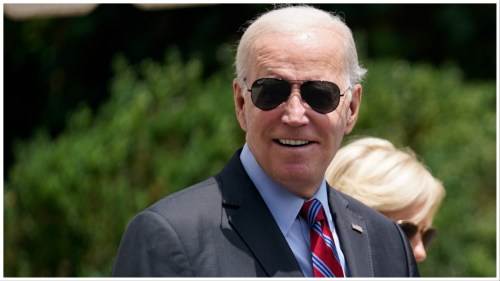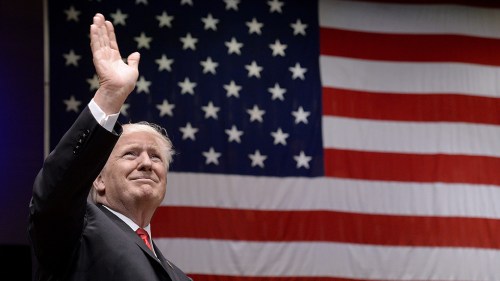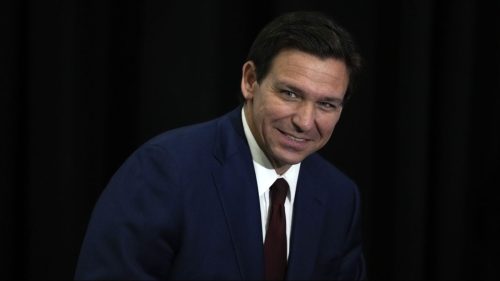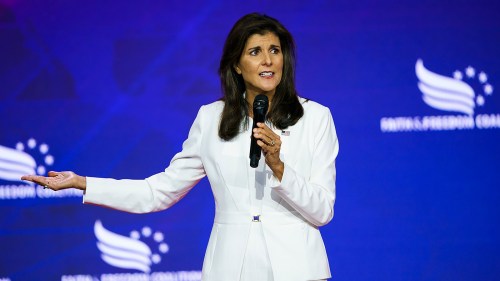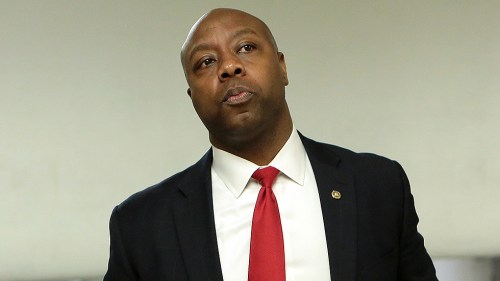Divisions emerge between 2024 Republicans over Israeli-Palestinian conflict
Tensions spurred by the Israel-Hamas war are boiling over in the Republican presidential primary as the contenders issue responses to the escalating conflict.
On Saturday, Florida Gov. Ron DeSantis said the U.S. should not take Palestinian refugees from Gaza because they “are all antisemitic.” Former U.S. Ambassador to the United Nations Nikki Haley pushed back on DeSantis’s remarks, saying on CNN that “you can separate civilians from terrorists … but right now, we can never take our eyes off of the terrorists.”
Meanwhile, a super PAC supporting former New Jersey Gov. Chris Christie rolled out an ad Monday hitting former President Trump for calling Hezbollah, which the U.S. designates as a terror organization, “smart.”
The dynamic comes as the situation in the Middle East deteriorates, with Palestinians in Gaza facing a dire humanitarian crisis and Israelis confronting the possibility of further attacks from regional adversaries.
“I think there’s one main division and that was caused by Trump’s comments about Netanyahu,” said Doug Heye, a veteran Republican strategist. “That should give every Republican running against Trump a reason to demonstrate leadership here both in what they’ve done and what they want to do.”
Haley referenced this in her CNN interview Sunday, when she was asked about Trump’s comments criticizing Israeli Prime Minister Benjamin Netanyahu for not being “prepared” for the terror attack, as well as for his remarks about Hezbollah.
“I can tell you at the United Nations when I was there, and I dealt with all of them every day, you don’t go and compliment any of them because what that does is it makes America look weak,” Haley told CNN’s Jake Tapper. “What you do is you show strength. You let them know what we expect of them.”
“This isn’t about Trump. It’s not about him. It’s not about what happened in the past. We’ve got to look forward,” she said.
DeSantis and his campaign also criticized the former president’s remarks, but like Haley, he has leaned into his experience in the region.
“DeSantis has something that no other candidate has, in that he’s worn the uniform in the Middle East,” said Justin Sayfie, a Republican strategist.
The Florida governor was deployed to Iraq in 2007.
“It remains to be seen whether the military conflict in the Middle East is contained to Israel and Gaza or if it moves beyond,” he said. “Does it move into Lebanon? Does it move into other countries? Do other countries get involved? I think that’s the risk the Biden administration through diplomatic means and military means is trying to contain.”
Trump’s campaign said last week the former president was not complimenting Hezbollah, but rather remarking on its strategic capabilities.
“President Trump was clearly pointing out how incompetent Biden and his administration were by telegraphing to the terrorists an area that is susceptible to an attack. Smart does not equal good. It just proves Biden is stupid,” the former president’s campaign said.
On Monday during a speech in Iowa, Trump touted his administration’s record on supporting Israel.
“So I fought for Israel like no president ever before recognizing Jerusalem as Israel’s capital, which is a big deal,” Trump said during the address. “And [I] even recognized Israel sovereignty over the Golan Heights, something that they never even thought — we gave them that.”
“And when I left, Iran was weak and desperate, and they wanted to do and Joe Biden came along and he just made them so happy,” the former president said. “I wonder if he gets a deal from them too, like he does from everyone else,” he added, before emphasizing that “we stand with Israel.”
But Trump’s critics have continued to lay into him over the Hezbollah comments. On Monday, the Tell It Like It Is PAC, which is affiliated with Christie, rolled out a 60-second ad featuring the clip from Trump’s speech last week in which he said Hezbollah is “very smart, they’re all very smart.”
The spot then shows an interview Christie did with CNN following Trump’s remarks in which he calls Trump “a fool.”
“Only a fool would give comments that could give aid and comfort to Israel’s adversary in this situation,” Christie said in the interview.
Heye suggested it was a necessity to attack the former president on this issue as a means to take him down in the primary.
“If the conversation is how Nikki Haley disagrees with Vivek [Ramaswamy] who disagrees with DeSantis, then the candidates have lost the plot. The nomination does not go around Trump, it goes through him,” Heye said “It’s up for them to decide if are they running against Donald Trump or not.”
But there are divisions forming over other issues besides how to talk about Hezbollah.
DeSantis said over the weekend the U.S. should not accept Palestinian refugees from Gaza, arguing other Arab nations should take in the region’s refugees.
“If you look at how they behave, not all of them are Hamas, but they are all antisemitic. None of them believe in Israel’s right to exist,” DeSantis said.
Trump went even further Monday, vowing in a speech to supporters in Iowa he would oppose allowing refugees from Gaza into the United States.
“We aren’t bringing in anyone from Gaza, or Syria, or Somalia, or Yemen, or Libya, or anywhere else that threatens our security,” he said, according to prepared remarks.
The former president went on to add he would instate “strong ideological screening” for immigrants coming into the country.
Yet other candidates have stopped short of saying the U.S. should not take in refugees from the conflict.
“We’ve continued to work with Egypt to provide safe passage for American citizens, and we should continue to work with our folks that we can in order to make sure that there’s a passage,” said Sen. Tim Scott (R-S.C.), speaking at an event in New Hampshire.
Haley has been critical of Arab countries for not taking Palestinian refugees in.
“Where are the Arab countries? Where are they? Where is Qatar? Where is Lebanon? Where is Jordan? Where is Egypt?” Haley said in her CNN interview. “The Arab countries aren’t doing anything to help the Palestinians because they don’t trust who is right, who is good, who is evil, and they don’t want it in their country. So they’re gonna come and blame America, they’re gonna come and blame Israel, and don’t fall for it, because they have the ability to fix all of this if they wanted to. They have the ability to go in and tell Hamas right now to stop what they’re doing.”
Haley was also asked about DeSantis’s comments on anti-Semitism and Palestinians.
“I dealt with this every day for two years,” Haley said, referring to her time at the U.N. “Half of them [Palestinians] at the time I was there didn’t want to be under Hamas’ rule. They didn’t want to have terrorists overseeing them. They knew that they were living a terrible life because of Hamas. You have the other half who supported Hamas.”
“There are so many people who want to be free from this terrorist rule,” she said.
But it is unclear how much this issue will impact Republican primary voters, given the voting bloc is overwhelmingly supportive of Israel and foreign policy does not tend to be a top priority for voters.
A CNN survey released on Sunday found 96 percent of American voters said they sympathize with Israeli people amid the conflict, while 87 percent said the same about Palestinians. Among Republicans, 98 percent said they had sympathy for the Israelis, and 77 percent said the same for Palestinians.
“I don’t know that GOP presidential primary voters are necessarily attuned to the nuances of policy in the Middle East,” Sayfie said. “The GOP presidential contenders have expressed views that are 85 [percent] to 90 percent aligned.”
“Whether there are nuance differences on certain aspects of the post-Hamas attack policy, I don’t think it’s going to matter much to GOP presidential primary voters,” he said.
Copyright 2023 Nexstar Media Inc. All rights reserved. This material may not be published, broadcast, rewritten, or redistributed. Regular the hill posts
Video/Hill.TV

